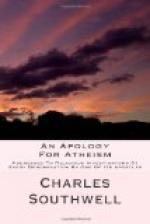Theists of every class would do well to calmly and fully consider this rule of philosophising, for it involves nothing less than the destruction of belief in the supernatural. The Jupiter of Mythologic History, the Allah of Alkoran, and the Jehovah of ‘Holy Scripture,’ if entities at all, are assuredly entities that baffle human conception. To ‘frame clear and distinct ideas of them’ is impossible. In respect to the attribute of unknowability all Gods are alike. They are all supernatural; and the merely natural cannot attach rational ideas to names assumed to stand for something above nature. It is easy to talk about seeing the Creator in creation, looking through nature up to nature’s God, and the like, but very difficult to have any idea whatever of a God without body, parts, or passions; that is to say, the God set forth in one of the Church of England’s Thirty-Nine Articles.
No such God can be believed to exist by reasoners who rigidly abide by John Locke’s rule of philosophising, and if it be urged that he, the author of the rule, was a Theist and a Christian—our answer is, that in such case, like many other philosophers, he practically gave the lie to his own best precept.
Books have been written to exhibit the difficulties of (what priests choose to call) Infidelity; and without doubt unbelief has its difficulties. But according to a universally recognised rule of philosophising, of two difficulties we are in all cases to choose the least. From a rule so palpably just no one can reasonably depart, and the Atheist, while freely admitting a great difficulty on his own side, is satisfied there can be demonstrated an infinitely greater difficulty on the side of his opponents. The Atheist labours to convince mankind they are not warranted by the general course of Nature in assigning to it a Cause, inasmuch as it is more in accordance with experience to suppose Nature the uncaused cause, than to imagine, as religionists do, that there is an uncaused cause of Nature.




